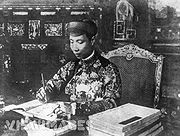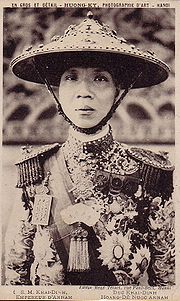
Khai Dinh
Encyclopedia


Emperor
An emperor is a monarch, usually the sovereign ruler of an empire or another type of imperial realm. Empress, the female equivalent, may indicate an emperor's wife or a woman who rules in her own right...
of the Nguyễn Dynasty in Vietnam
Vietnam
Vietnam – sometimes spelled Viet Nam , officially the Socialist Republic of Vietnam – is the easternmost country on the Indochina Peninsula in Southeast Asia. It is bordered by China to the north, Laos to the northwest, Cambodia to the southwest, and the South China Sea –...
. His name at birth was Prince Nguyễn Phúc Bửu Đảo. He was the son of Emperor Đồng Khánh, but he did not succeed him immediately. He reigned only nine years: 1916 - 1925.
Biography
After Emperor Đồng Khánh's era came the eras of Emperor Thành TháiThanh Thai
Emperor Thành Thái of the Vietnamese Nguyễn Dynasty was born Prince Nguyễn Phúc Bửu Lân, son of Emperor Duc Duc. He reigned for 18 years, from 1889 to 1907.-Biography:...
and Emperor Duy Tân
Duy Tan
Emperor Duy Tân , was a boy emperor of the Nguyễn dynasty and reigned in 9 years between 1907 and 1916. His name was Prince Nguyễn Phúc Vĩnh San and was son of the Thành Thái emperor...
, both of whom were exiled by the French for their resistance to the colonial regime. After this trouble, the French decided to enthrone Bửu Đảo as he was the son of the monarch who was the most submissive Nguyễn collaborator with the colonial regime, standing with the French colonizers and opposing any independence movements, Emperor Đồng Khánh.
Nguyễn Bửu Đảo became the nominal ruler of Annam on 18 May 1916, after the exile of Duy Tân (Nguyễn Phúc Vĩnh San) and took the name Khải Định for his reign, meaning "auger of peace and stability." He said he wanted to restore the prestige of the empire, but this was not possible with his close collaboration with the French occupiers. Although not satisfied with his position, Khải Định enacted a policy of close collaboration with the French government, following all of their instructions to give "legitimacy" to French policies.
Because of this, Khải Định was very unpopular with the Vietnamese people. The nationalist leader Phan Châu Trinh
Phan Chu Trinh
Phan Chu Trinh also known as Phan Châu Trinh was a famous early 20th century Vietnamese nationalist. He also used the alias Tây Hồ. He sought to end France's brutal occupation of Vietnam...
accused him of selling out his country to the French and living in imperial luxury while the people were exploited by France. Nguyễn Ái Quốc (later known as Hồ Chí Minh
Ho Chi Minh
Hồ Chí Minh , born Nguyễn Sinh Cung and also known as Nguyễn Ái Quốc, was a Vietnamese Marxist-Leninist revolutionary leader who was prime minister and president of the Democratic Republic of Vietnam...
) wrote a play about Khải Định called "The Bamboo Dragon" that ridiculed him as being all grand appearance and ceremony but a powerless puppet of the French in government. His 1922 visit to France to see the Marseilles Colonial Exhibition was also ridiculed by nationalist leaders, who naturally hated Vietnam's status as a colonial subject of France and saw nothing in the exhibition worth celebrating.
Emperor Khải Định's unpopularity reached its peak in 1923 when he authorized the French to raise taxes on the Vietnamese peasants, part of which was to pay for the building of his palatial tomb, and which caused a great deal of hardship. He also signed the orders of arrest against many nationalist leaders, such as Phan Boi Chau
Phan Boi Chau
Phan Bội Châu was a pioneer of Vietnamese 20th century nationalism. In 1903, he formed a revolutionary organization called the “Reformation Society” ....
, forcing them into exile and having their followers who were captured beheaded.
Marriages
Khải Định married, as his first wife, Hoang Thi Cuc, in 1907.He married as his second wife (1890–1980), in 1913, a daughter of Ho Dac Trung, who became Annam's Minister for Public Instruction. They had no child.
Later, he had one son with one of his concubines, Tu Cung. She was crowned to Queen due to giving birth to their son, Nguyen Phuoc Thien, who became Prince Vinh Thuy and later Emperor Bảo Đại
Bảo Đài
Bảo Đài is a commune and village in Lục Nam District, Bac Giang Province, in northeastern Vietnam.-References:...
.
The king also had four secondary wives and 10 concubines.
Death
Khải Định suffered poor health like his father and became a drug addict. He eventually died of tuberculosis at the Purple Forbidden City in HuéHue
Hue is one of the main properties of a color, defined technically , as "the degree to which a stimulus can be describedas similar to or different from stimuli that are described as red, green, blue, and yellow,"...
, according to his concubine Ba Phi, who described him as "not interested in sex" and "physically weak".

